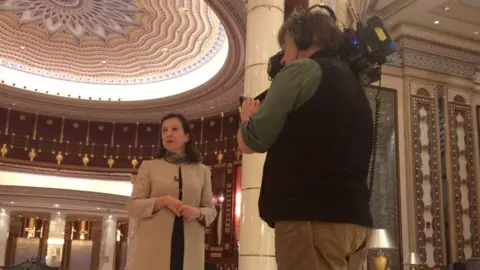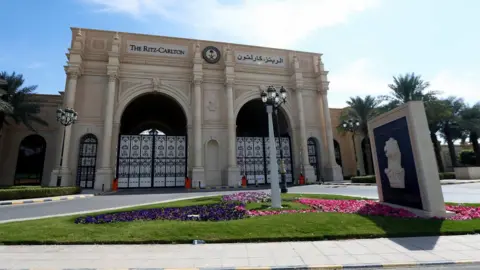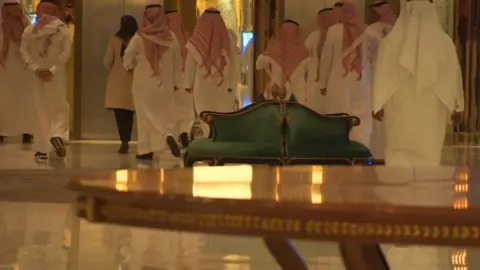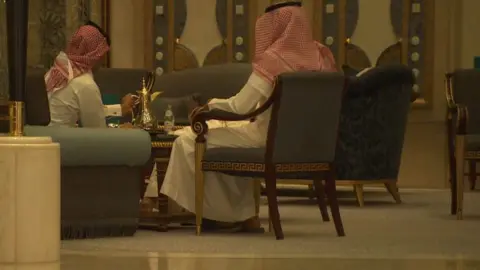Saudi Arabia detentions: Living inside 'five-star prison'

Riyadh's palatial Ritz-Carlton hotel, branded as "a retreat for those who simply desire the royal treatment", now finds itself transformed into a nerve centre for an audacious manoeuvre by an ambitious crown prince.
It's not the treatment more than 200 of Saudi Arabia's richest and most powerful ever expected, and certainly never desired, when 32-year old Mohammed Bin Salman launched what was billed as an unprecedented drive against corruption and abuse of power and privilege in the kingdom.
Three weeks on, Riyadh's most prestigious hotel is still the talk of the town. But since the midnight raids which snared at least 11 princes and some of the biggest Saudi billionaires, only snippets have surfaced. Rumours swirl around Riyadh and many capitals beyond about what's really happening inside this gilded prison.
No one goes in or out of its swirling black metal gates now without official permission.

Just past midnight last week, we were allowed to drive in under police escort, down a sweeping avenue towards the sprawling complex washed in golden light.
As we alighted, we were greeted by some of the impeccable hotel staff still offering round the clock five star service. But there was a sterner reception from Saudi officials now involved in this crackdown: no faces to be filmed by our crew; no conversations recorded during a first visit by journalists.
A stay lasting a few hours, surrounded by officials, could never yield a full account. But it provides glimpses of life inside.
Even in the dead of night there are huddles of men, dressed in traditional white robes and red and white chequered headdress, speaking in hushed tones in dark corners of the cavernous lobby. Hardly anyone raises their eyes. Only an occasional tinkle of silver spoons on porcelain tea cups or glasses of foaming café lattes breaks an eerie silence.
Who are the 'special guests'?
The mood, around the same hour on 4 November, must have been starkly different when some of Saudi Arabia's most privileged elite were forcibly checked in.
"They didn't believe what was happening," says an official who identifies himself as belonging to the "Special Committee" pursuing this anti-corruption operation. "They thought it was just a show which wouldn't last long."
"Sure they were angry," he admits, with barely concealed satisfaction. "If you tell someone 'you are a thief', they get angry. Imagine if they are a VIP."
We're sitting in one of the lobby's elegant clusters of sofas and plush chairs along with an official from the public prosecutor's office, and what's described as an independent human rights society. We're provided with a briefing, on the condition that no-one is quoted by name.
Why bring them here? "We were afraid some people would have escaped so we had to keep them inside", is the explanation for this strange, if not shocking, fate for people they refer to as "special guests".
 Reuters
ReutersThere's been no official announcement of this Saudi 'who's who' list. But high profile names had surfaced quickly, including the well-known and wealthy Prince Alwaleed bin Talal who owns shares in everything from Twitter and Apple to the Four Seasons Hotel and London's Savoy.
The crown prince's cousin Miteb bin Abdullah, who headed the elite National Guard, is now said to spend his nights in the Ritz too.
And why these people, not others, which led to assertions that this was more of a ruthless move against royal rivals and critics?
"Everyone here has a file," replies the sombre-faced official from the Public Prosecutor's Office. "Everything is documented."
Over the past two years, under the crown prince's direction, a team has been compiling alleged evidence in great secrecy with some documents dating back decades.
Then, once a new anti-corruption committee was announced by royal decree, the money hunters made their move.
Questions about legality are met with references to Saudi law and the independence of the Public Prosecutor.
The judicial official clarifies that this is still "a pre-investigation". "We're asking people who took the money to give it back," he says.
"It's a friendly process," chimes in the anti-corruption official who says everyone was told "we'll show you the evidence and we'll solve the problem".
Medical crises and mistreatment rumours
An image is painted of a process taking place behind closed doors, mainly inside hotel rooms where 201 detainees are now said to spend most of their time. Most, we are told, want to avoid running into others. Most want to just focus on finding a way out of here.
The mood now is described as "very serious".
An official rattles off the Ritz-Carlton's new register of guests which includes experts from government ministries, the treasury, stock market, ex-bankers, specialists in money laundering, justice, as well as real estate. They're said to be on shift 24 hours a day, seven days a week to help process these cases.
Some stay in the hotel and some work from their own offices. Along with medical teams and security guards, more than 500 people are now registered as staying at Ritz-Carlton, at the Kingdom's expense.
As of a few days ago, seven suspects had walked free. Accounts provided inside the hotel, and confirmed by sources outside, say they had been able to clarify what was in their file and prove their innocence.
Official sources say 4% of the accused say they'll take their case to court. But 95% of people on the list are now reportedly ready to come to a deal. That would mean handing over significant amounts of cash or assets to the Saudi treasury in exchange for their freedom.
A businessman in Riyadh, who has seen some of the documents, had told me 1,900 bank accounts, including ones belonging to family members of suspects, were frozen. I ask officials in the Ritz-Carlton about reports of cash and assets totalling 800 billion dollars.
"Even if we get 100 billion back, that would be good," replies the official from the Special Committee.
His zeal is palpable. "You see this," he says as he picks up a gold-rimmed coffee cup to explain his point. "It should cost 10 dollars. But with corruption, it costs 100 dollars." Then he cities examples from his files including unfinished schools, and hospitals which cost 100 million dollars whose price tag should have been less than a third of that.
Outside this inner sanctum, rumours surface about mistreatment and medical crises.
"Some guests are old, and some suffer from diabetes, heart problems, or other conditions," the human rights official explains in our briefing.
He says a health centre is staffed around the clock by doctors and nurses, rooms are checked, and special medicines are brought from homes.

It's not hard to imagine the extraordinary anger and stress which must also fill this hotel.
Saudis who once held sway in the kingdom are now being held captive against their will.
"If you do surgery, there will be pain," says the anti-corruption official matter-of-factly. "And some people outside are angry because their bosses, or their family members, are in here."
But he insists that "when it comes to percentages, 99% of Saudis are happy".
'I stay in my room'
It's hard to be scientific about public opinion here. But conversations outside the Ritz's metal gates underline there is broad support for tackling what is known to be rampant corruption.
"It's like losing your watch and then you find it," a young real estate developer tells me. "It's your watch, so you want it back."
"Our documents are going through government offices more quickly," remarks a prominent business executive who says no-one dares ask for bribes now.
But there's anxiety too. "It's a nightmare," exclaims a Saudi doctor. " My son's boss is inside and we're all worried." She speaks of rumours of abuse during interrogations and of heart doctors being called in.
In my Ritz briefing, we only hear of what are called "lifestyle problems".
"They can have everything they want in this five star plus hotel," one official says.
"But we can't bring special food from a special country," he adds. When I ask for more details, I'm told of a request for Russian caviar. Others are said to have asked for their own barber, their own masseuse.
Saudis used to calling the shots have had their mobiles taken away. Now they can only make calls on what's described as a hotphone in their rooms. Lawyers and family members are being rung.
There are also calls and visits from officials working in their own companies so they can keep business running. Visitors enter through back doors to guard their privacy. Emails can also be arranged.

In the early hours of the morning, a few men are working out in the gym, a shimmering swimming pool is empty, and music blares in an empty bowling alley.
I'm offered a meeting with a suspect chosen by our escorts.
"I'm spending most of my time in my room with my lawyer focusing on my case," a Saudi man with a grey-flecked beard tells me as he sits next to a television broadcasting Premier League football. "I speak to my family on the phone every day but prefer not to have them visit me here."
My escorts tell me not to ask about his case. In such conditions, surrounded by officials in charge of his fate, I don't ask many questions.
As we leave, he quickly speaks up.
"I'm sorry that I forgot our traditions," he says with an apologetic smile. "I should have offered you something to eat or drink."
Until this Ritz-Carlton moment is over, a fuller truth about this extraordinary saga won't be known. Officials say they hope everyone will be checked out of this hotel by the end of this year or early January.
"The crown prince has to close this chapter quickly," a prominent Saudi investor tells me in a whispered conversation in Riyadh. "If it drags on, questions will continue to be asked."
